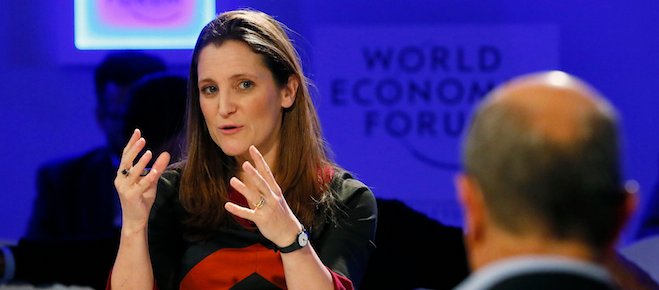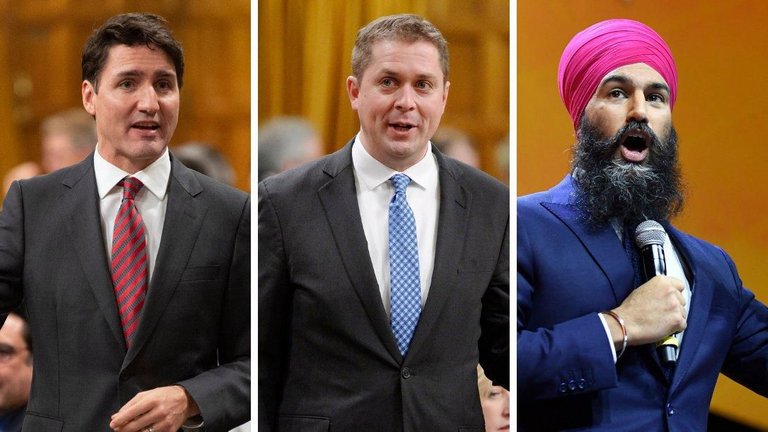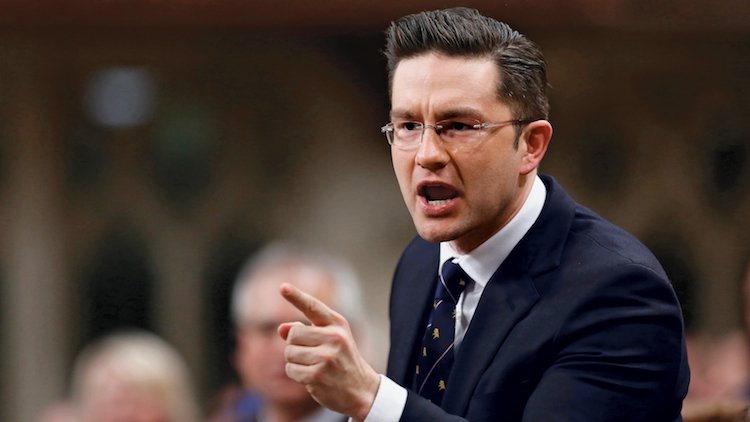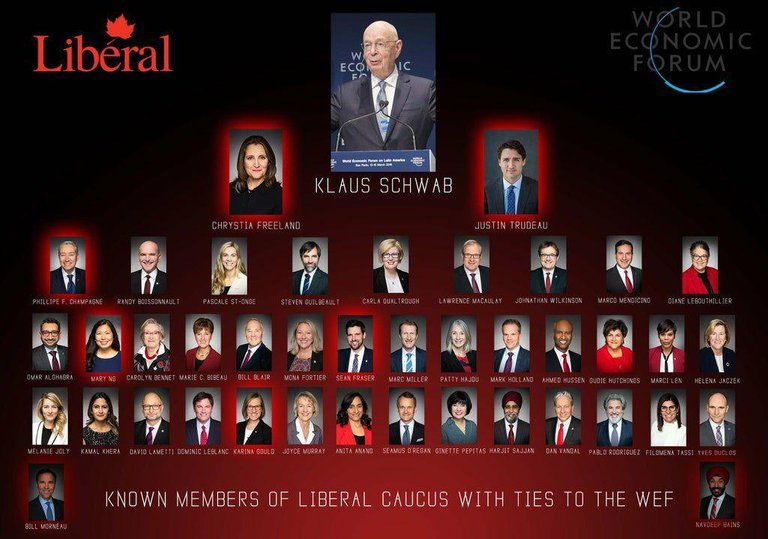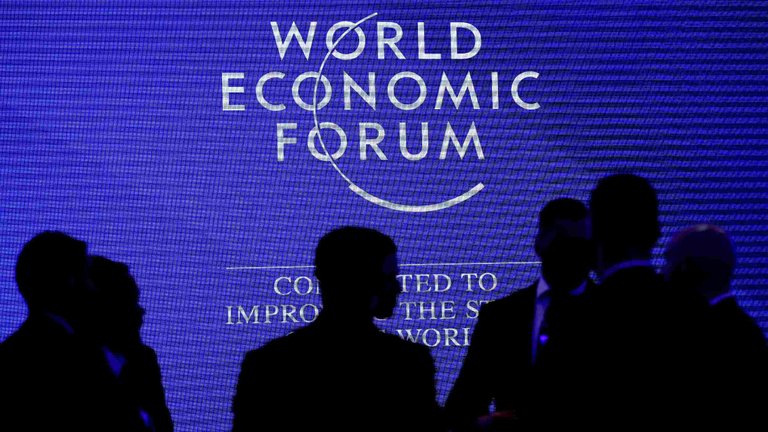
In the previous post we outlined the long list of Canadians tied to the World Economic Forum (WEF). This post focuses attention on the leadership of Canada's three major federal political parties, as well as members of parliament, cabinet positions (ministers), and key political figures who are associated with the WEF.
For those familiar with Canadian politics, it is striking to note that leaders from all three major federal political parties, the Liberals, Conservatives and NDP are currently, or have been, members of the WEF.
The starting point of this investigation is Prime Minister Trudeau's government. As mentioned in the previous post, the deputy Prime Minister and Canada's Minister of Finance, Chrystia Freeland, is a member of the board of Trustees of the WEF. Apart from the PM, Freeland is the most senior, as well as the most active, Canadian political official that has attended the WEF Davos. Her predecessor as Finance Minister, William Morneau, also attended Davos in 2016 when he served in Trudeau's Cabinet from 2015 to 2019.
WEF and Canada's Liberal Party
Justin Trudeau (Lib)
- Prime Minister
- Leader of Liberal Party
- WEF Young Global Leaders program
Members of Current Cabinet and Former Ministers
Chrystia Freeland (Lib)
- Deputy Prime Minister
- Finance Minister
- former Minister of Foreign Affairs
- WEF Board of Trustees
- WEF Young Global Leaders program
- Board of Directors Aspen Institute Kiev
William Francis Morneau (Lib)
- former Finance Minister
Francois-Philippe Champagne (Lib)
- Minister of Innovation, Science and Industry
- former Minister of Foreign Affairs
- WEF Young Global Leaders program
Michael Sabia (Lib)
- Deputy Finance Minister
- former head of CDPQ (Quebec Pension Plan)
- former CEO BCE (Bell Canada)
Melanie Joly (Lib)
- Minister of Foreign Affairs
Sean Fraser (Lib)
- Minister of Immigration, Refugees and Citizenship
Catherine McKenna (Lib)
- former Minister of Infrastructure and Communities
- former Minister of Environment and Climate Change
Navdeep Bains (Lib)
- former Minister of Innovation, Science and Industry
Scott Brison (Lib)
- former parliament member, Bank of Montreal executive
Terry Beech (Lib)
- member of parliament
- Secretary to Minister of various industries - Fisheries and Oceans, Transportation and Finance
Rasha Al-Katta
- Permanent Mission to the United Nations
Jonathan Fried
- Global Affairs Canada
Elissa Goldberg
- Global Affairs Canada
- WEF Young Global Leaders program
Alishia Campbell
- Ambassador of Canada to European Union
- Global Affairs Canada
- WEF Young Global Leaders program
Kevin Lynch (Lib)
- 30 years in Government of Canada
- former Privy Council Office of Canada
Karina Gould (Lib)
- Minister of Families
- WEF Young Global Leaders program
Dr. Helena Jaczek (Lib)
- member of parliament
- former Minister of Community and Social Services
*Mark Carney
- former governor of the Bank of Canada
- Board of Trustees WEF
- potential future Liberal leadership candidate
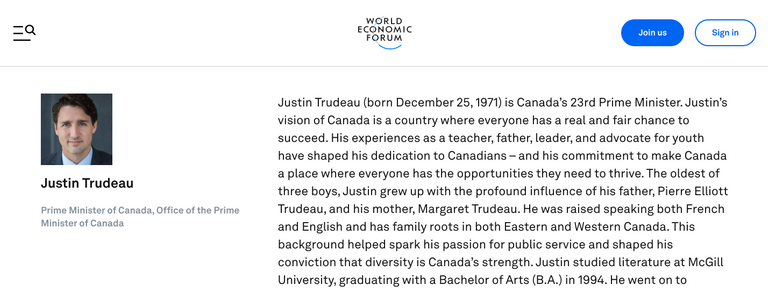
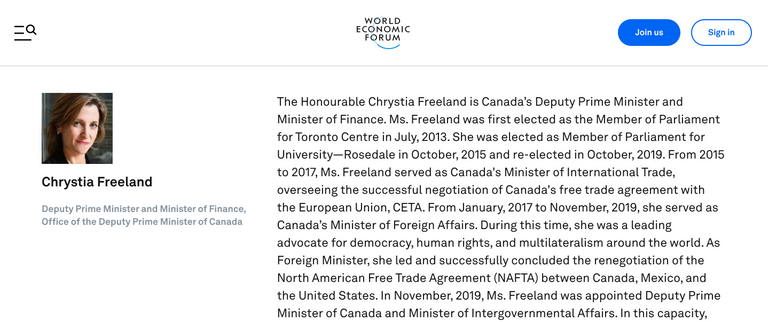
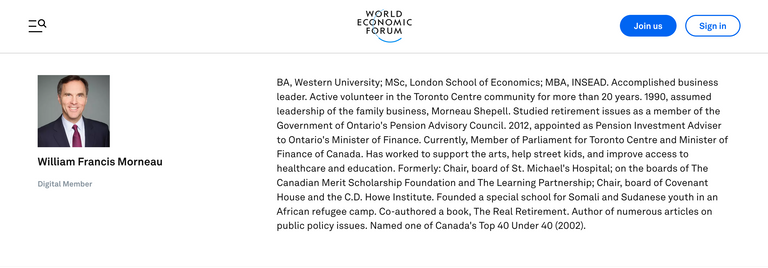
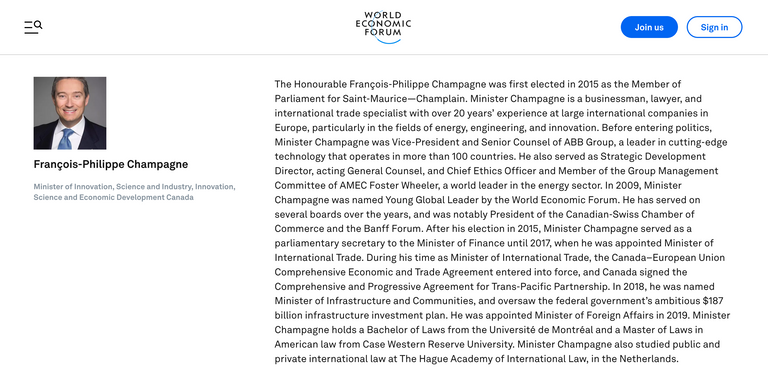
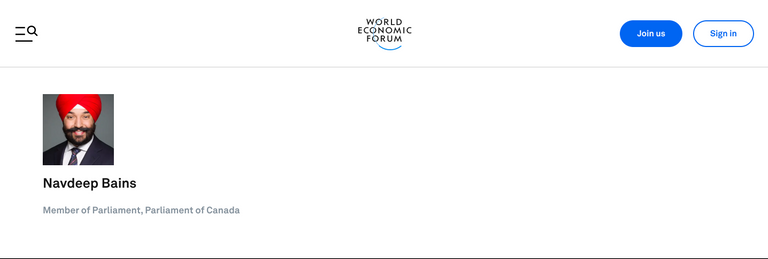

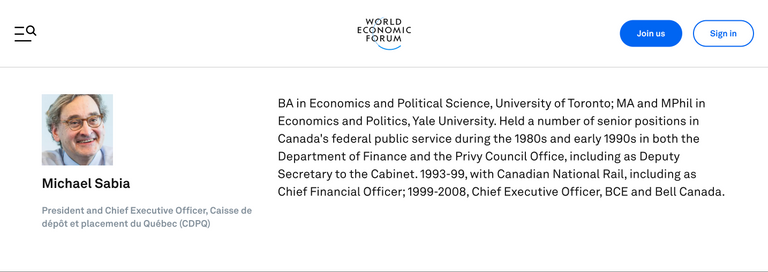
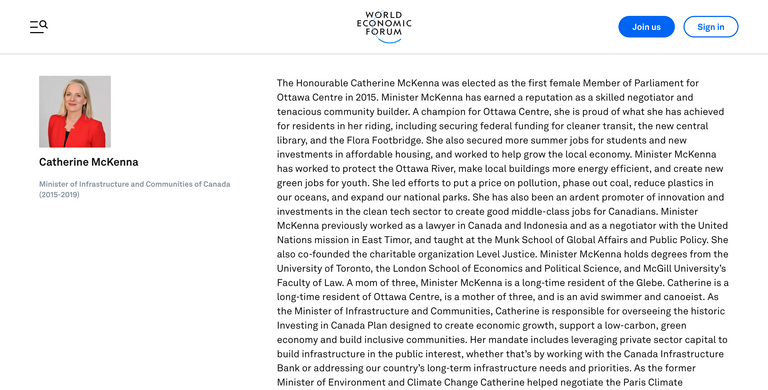

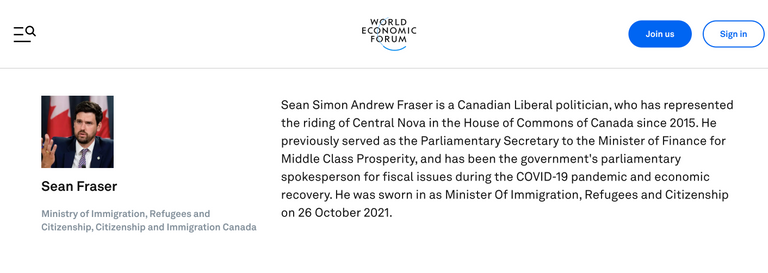
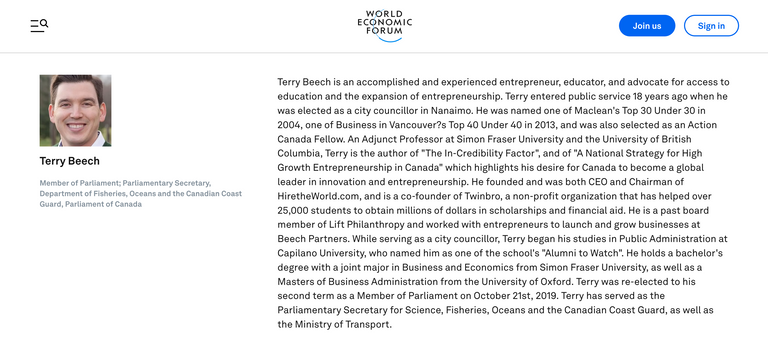
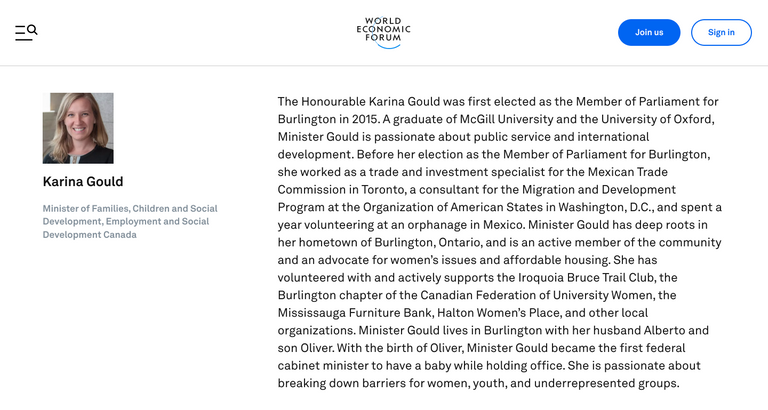

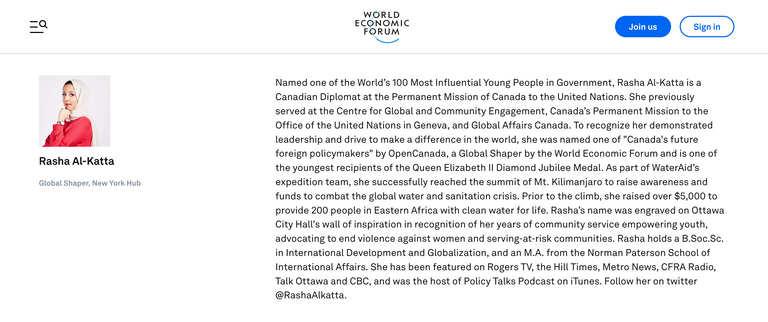

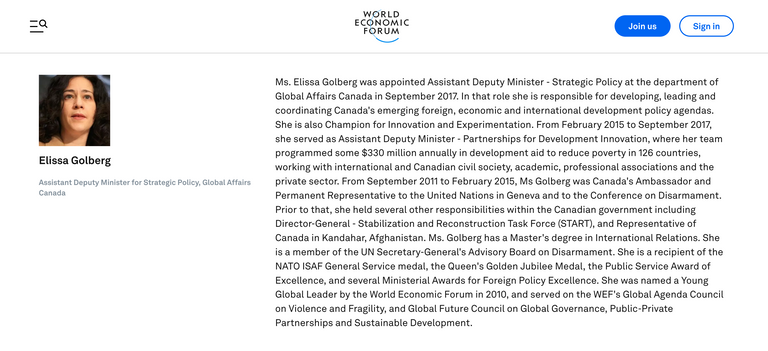

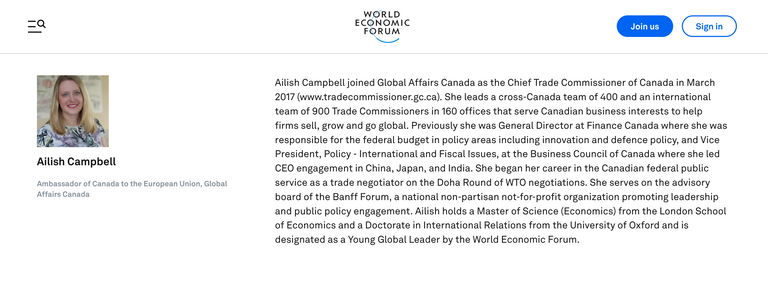
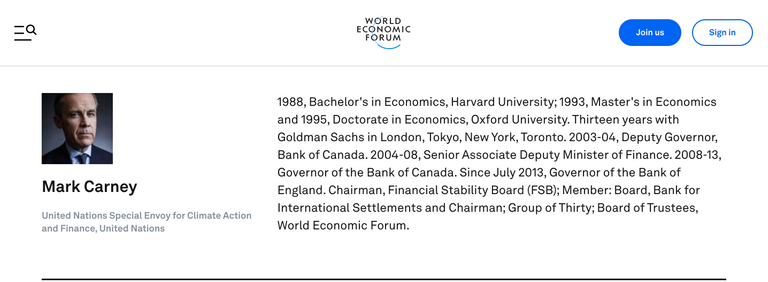
Canadian Ministers at Davos 2016
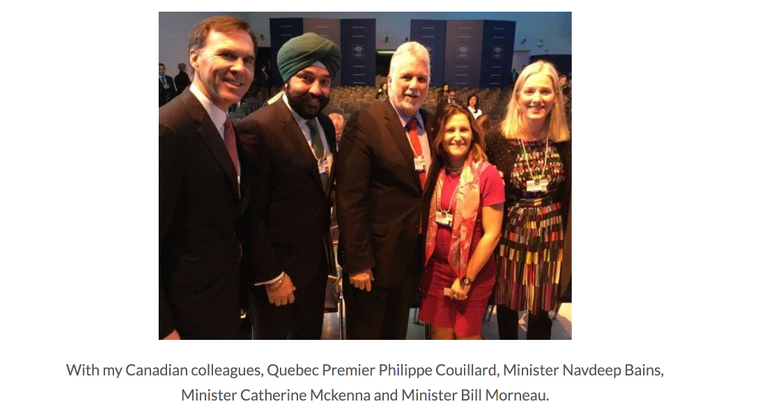
[From left: Morneau, Bains, Couillard, Freeland, McKenna at Davos 2016]
Captured Government?
At the Harvard Kennedy School in 2017, Klaus Schwab infamously stated that the WEF had "penetrated" more that half of Trudeau's Cabinet. While his statement appears to be an exaggeration of the actual number, there's little doubt that a significant portion of Trudeau's cabinet are openly affiliated with the WEF.
In particular, high-profile positions such as Ministers of Finance, Foreign Affairs and Innovation, Science and Industry are consistently represented by WEF members. These Cabinet positions also happen to aline with core tenets of the WEF agenda focusing on technology, finance and international coordination.
Finance Ministers:- Chrystia Freeland, William Morneau
Foreign Affairs Ministers:
- Francois Champagne, Chrystia Freeland
Innovation and Science Ministers:
- Francois Champagne, Navdeep Bains
Over the last several years, Chrystia Freeland has become a rising star in Trudeau's Liberal party and a central figure in Canada's current government. Mrs. Freeland wields considerable power and influence within Trudeau's cabinet working double-duty as both the nation's Minister of Finance and as the Prime Minster's second in command as Deputy Prime Minister. On top of this impressive workload, Freeland simultaneously serves as on the Board of Trustees of the World Economic Forum.
Previously, Freeland also served as Canada's Minister of Foreign Affairs when she attended the 2016 Davos conference alongside several other Canadian officials. Then Minister of Finance, William Morneau, former Minister of Infrastructure and Communities, Catherine McKenna, former Innovation, Science and Industry Minister, Navdeep Bains and former Quebec Premiere Philippe Couillard accompanied Freeland to Davos in 2016
The most powerful member of Trudeau's Cabinet also has the deepest ties to the WEF. Chrystia Freeland, has been a frequent attendee at Davos covering the event as a journalist for Reuters in the past. Freeland has acted as a moderator for panel discussions and has interviewed some of the forum's most high-profile guests.
Former colleagues at Reuters dubbed Freeland "The Billionaire Whisperer" for her uncanny ability to cozy up to, and in some cases befriend, the world's elite.
As we shall see in part 2, Freeland is a central figure in developing and promoting the Davos agenda.
Trudeau Addresses the World Economic Forum
In 2016 and 2018 Trudeau attended the WEF in Davos and on each occasion delivered flowery keynote speeches.
Today we are gathered here to contemplate whether we are in the stages of the Fourth Industrial Revolution about to begin. What a breathtaking possibility that is. Steam power changed the world utterly. So did electricity. And, more recently, computers. And now we may be on the cusp of change equal in magnitude and of a far swifter pace.
Addressing Davos attendees in 2016, Trudeau paid homage to a central idea of the WEF, the "Fourth Industrial Revolution" and the pivotal years of transformation ahead. Stringing together concepts of "diversity", "equality" and "technology" into a motivational soufflé, Trudeau posited that Canada is perfectly positioned to benefit from the fast approaching "Fourth Industrial Revolution". It just so happens that 2016 was the same year Klaus Schwab published his book of the same title.
In a nut shell, "The Fourth Industrial Revolution" describes a pivotal moment in time of great transformation and change. Just as the advent of the steam engine brought the first industrial revolution (1790), electricity the second (1890) and digital revolution the third (1960), "the Fourth Industrial Revolution" will also usher in an era of profound changes to society. Catalysts for change are emergent technologies such as: AI, machine learning, automation, biotech, and the internet of things that will impact every aspect of society.
https://www.weforum.org/focus/fourth-industrial-revolution
It is the fusion of these technologies and their interaction across the physical, digital and biological domains that make the fourth industrial revolution fundamentally different from previous revolutions.”
― Klaus Schwab, The Fourth Industrial Revolution
Conservative Party and New Democratic Party of Canada
*Pierre Poilievre (Con)
- member of parliament (Conservative leadership candidate)
[profile removed from WEF website]
*Andrew Scheer (Con)
- former leader of Conservative party
- WEF Young Global Leader program
[profile removed from WEF website]
Michelle Rempel Garner (Con)
- member of parliament
- WEF Young Global Leaders program
Stephen Harper (Con)
- former Prime Minister of Canada
John Baird (Con)
- former Foreign Affairs Minister
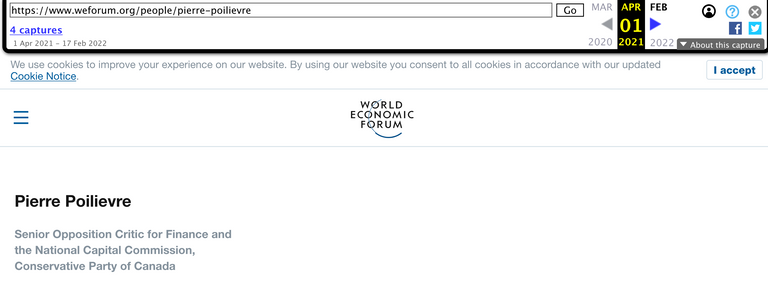

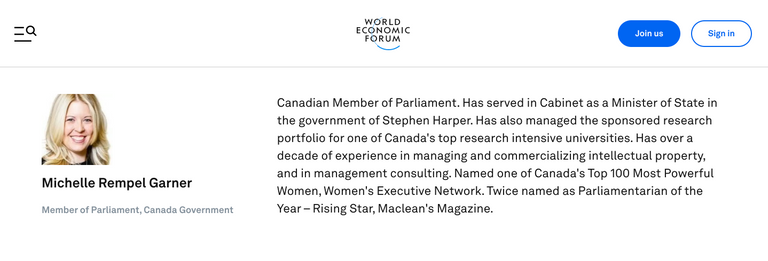

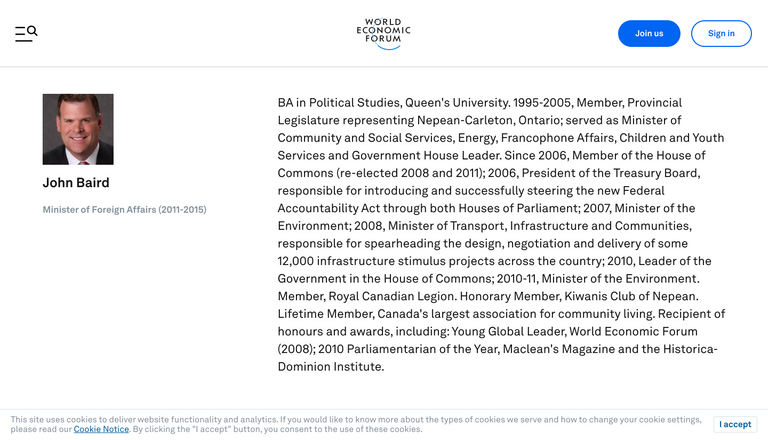
Jagmeet Singh (NDP)
- leader of the New Democratic Party
- WEF Young Global Leaders program
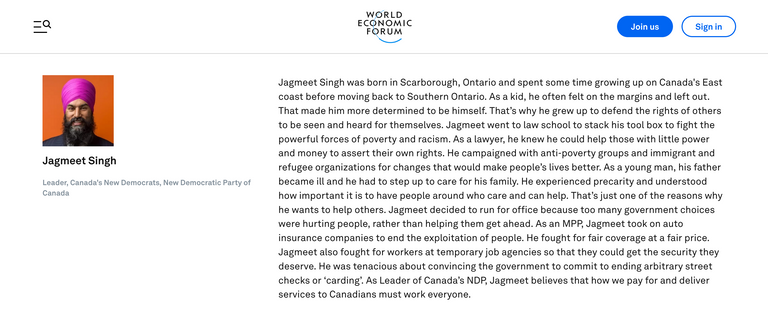
Canada's Controlled Opposition?
Canada's current government is a what is known as an minority government, where one political party does not have enough votes (representatives) in parliament to govern and pass legislation without support from another party. The Liberals depend on the votes by Canada's 3rd largest party, the NDP, to maintain power and continue the business of government.
Member of parliament and leader of the NDP, Jagmeet Singh, plays a key role in propping up the Trudeau government. Mr. Singh is also a card carrying member of the WEF.
On March 22nd 2022, Trudeau's Liberal Party and the NDP announced a deal that would ensure the Liberal's minority government would remain in power until 2025, as long as certain conditions are upheld.
The deal between the two parties is called - “Delivering for Canadians Now, A Supply and Confidence Agreement", where in exchange for backing and providing enough votes for the Liberals to maintain a stable government, the NDP gets assurances on a number of progressive issues shared by both parties including: dental care, pharma-care, climate change goals, childcare, a home buyers bill of rights and more.
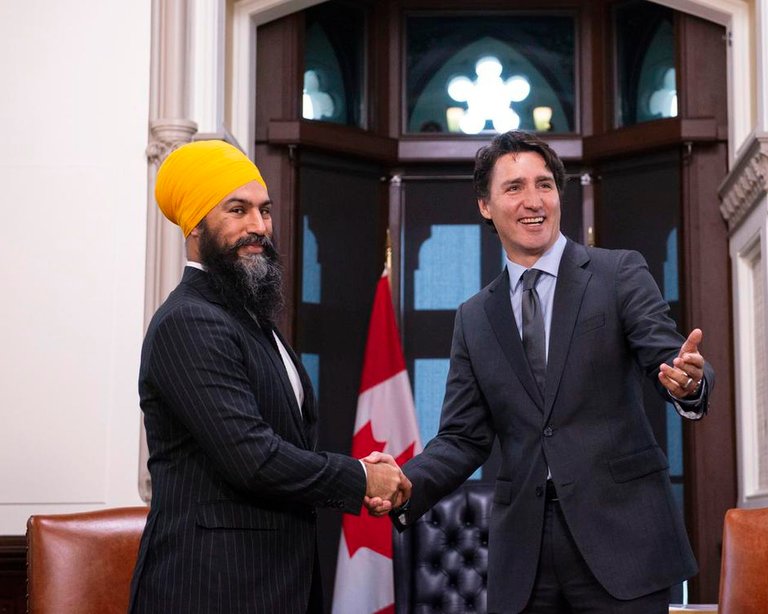
Toronto Star
According to Canadian news outlet CTV,
The kinds of votes the NDP will have to support through this deal include: budget bills, estimate and supply legislation, and other motions that the Liberals deem matters of confidence. The NDP have also agreed to not move a vote of non-confidence or vote for a non-confidence motion brought by another party during this time.
CTV
Ultimately, the deal ensures NDP support that will prop up Trudeau's government for the next 3 years. This political arrangement comes only a month after NDP support allowed the Liberal government to invoke the Emergency Act to end the Freedom Convoy of Canadian truckers protesting in Ottawa. A move that was roundly criticized as unnecessary and authoritarian.
Canada's official opposition, the Conservative party, appears to also have ties to the WEF. For starters, the former Prime Minister Stephen Harper, known for his robot-like demeanor and lack of personality of any kind, is also onboard with the WEF and is listed on their website. John Baird, who served in various positions in Harper's government including Minister of Foreign Affairs is yet another WEF fellow.
Next we have Andrew Scheer, who lead the Conservatives from (2017-2020). Scheer was also the Speaker of the House in Canada's parliament for several years. He too is connected to the elite Davos organization. For unknown reasons, Mr. Scheer's profile has been removed from the WEF website.
https://www.weforum.org/people/andrew-scheer
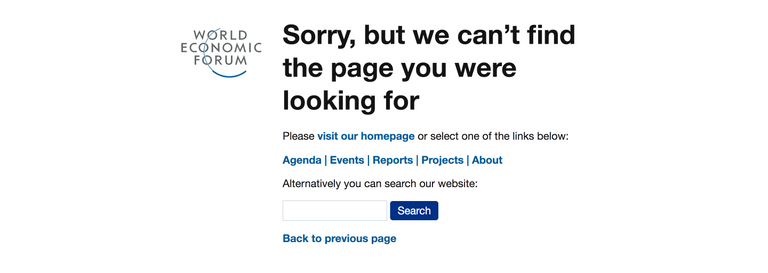
https://web.archive.org/web/20201207145848/https://www.weforum.org/people/andrew-scheer
Finally, we come to Pierre Poilievre who has recently thrown his hat into contention for the Conservative Party leadership after the resignation of Erin O'Toole who headed the party in the most recent federal elections.
Notably, throughout the pandemic Poilievre has been an outspoken critic of Prime Minister Trudeau and the government's handling of the pandemic response.
On more than one occasion the well spoken Poilievre has even accused the Trudeau government of being involved in a globalist plot to reorganize society specifically calling out the "Great Reset". In November 2020, Poilievre warned his constituents via his website;
that "global financial elites" are attempting to "re-engineer economies and societies" in order to "empower the elites at the expense of the people." Canadians ... "must fight back against global elites" and "their power grab."
Poilievre is an effective communicator and over the course of the past two years has portrayed himself as one of the harshest critics of the Trudeau government rejecting overreach and draconian mandates.
As the acting shadow Finance Minister Poilievre has craftily positioned himself as a defender of Canadian freedoms against the "Great Reset" agenda being pursued by an international power elite.
Remarkably, Poilievre has gone as far as launching a petition on his official website called "Stop the Great Reset" which amassed 26,000 signatures in late 2020.
The petition states:
Whereas Justin Trudeau told a United Nations conference: “This pandemic has provided an OPPORTUNITY for a RESET. This is our CHANCE to accelerate our pre-pandemic efforts to REIMAGINE economic systems... .”
Whereas global financial elites have called for the same "Great Reset", which would reengineer economies and societies to empower the elites at the expense of the people;
Whereas Canadians must fight back against global elites preying on the fears and desperation of people to impose their power grab.
Poilievre also uploaded a short YouTube video to accompany the petition where (without directly referencing the WEF) refers to the globalist plot and government power grabs as the "Socialist Reset" and the "Grand Reset".
There's just one problem.
Poilievre too, is a member of the WEF. However, his profile has been scrubbed from the organizations website but can still be seen using the web archive's Way Back Machine.
https://www.weforum.org/people/pierre-poilievre

https://web.archive.org/web/20210401060525/https://www.weforum.org/people/pierre-poilievre
Similarly, Poilievre's "Stop the Great Reset" petition and page has disappeared into obscurity. According to the Way Back Machine the petition was still accessible on Poilievre's site until January 10th 2022.
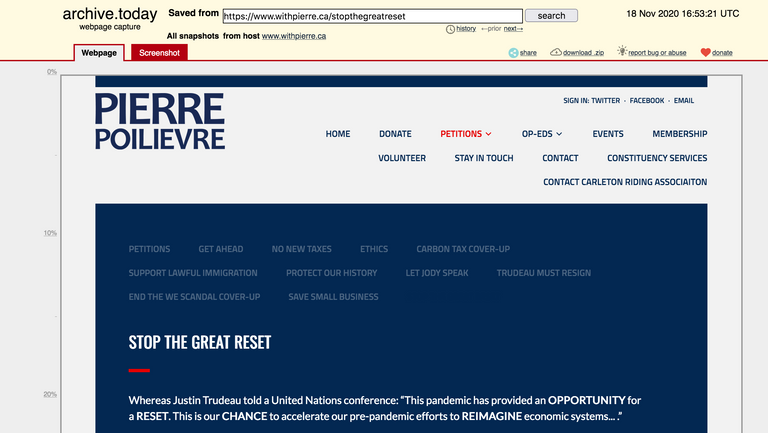
https://archive.ph/WR7vs#selection-457.0-525.130
https://web.archive.org/web/20210808074555/https://www.withpierre.ca/stopthegreatreset
It's certainly possible that Poilievre is simply a seasoned and opportunistic politician seizing on the "Great Reset" narrative to score political points as far as it's useful to his career ambitions. Yet, it's also strange that he and his team have suddenly gone silent on the matter. It's certainly curious that his website has removed all mention of the "Stop the Great Reset" initiative he was once so vocal about. It's even more curious that his profile on the WEF website has simultaneously been whitewashed.
WEF Influence On Canadian Politics
Effectively, this suggests that Canada's ruling Liberal government, with support from the NDP, and prominent leaders of the official opposition Conservatives are all closely connected to the WEF and the organization's agenda to reshape society.
The integration with the WEF includes past Prime Ministers, Foreign Affairs and Finance Ministers. It includes present Cabinet Ministers in key positions. Mrs. Freeland, a Board of Trustee with the WEF, occupies two key positions as Finance Minister and as Deputy Prime minister of Canada. It includes the leaders of all three major political parties of Canada. Furthermore, it includes future leaders with Conservative leadership hopeful Poilievre and WEF board of Trustee and, oft rumoured future of the Liberal party, global finance darling Mark Carney.
No matter which party comes to power in Canada, it is clear that the interests of the World Economic Forum are persistent and well represented at multiple levels in Canadian federal politics. The forum's agenda to re-engineer society will continue to unfold in Canada's politics unabated.
More Canada and the WEF
Upcoming posts in this series will feature deep dives on Canadian officials in key positions of government, the financial sector, banking, programs influenced by the WEF, Canadian legislation and more. Part 2 will feature Canada's Finance Minister, Chrystia Freeland.

